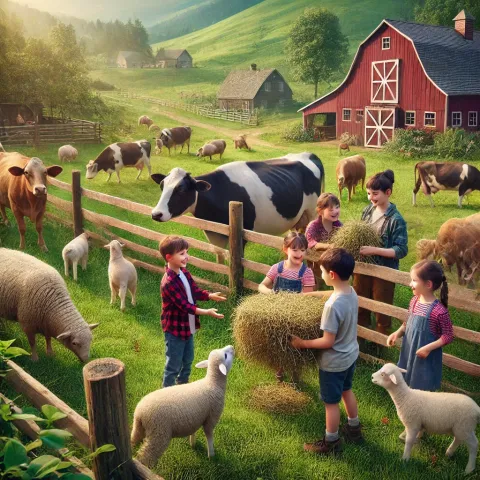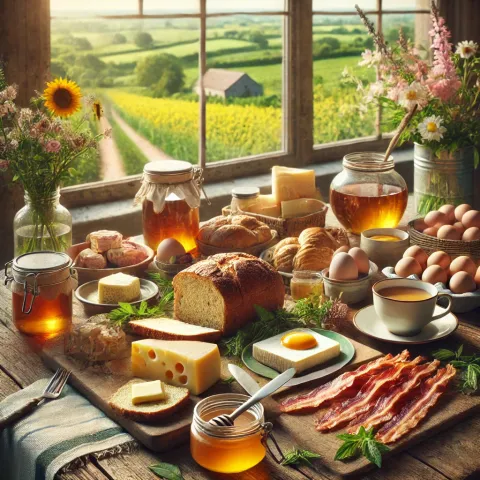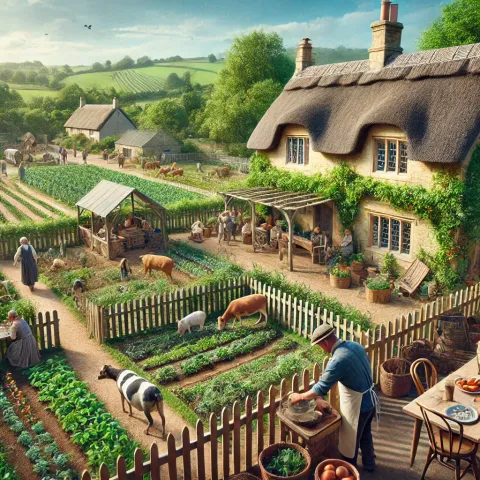Why is everyone longing to return to the village?
In today’s world of endless city noise, traffic, and digital distractions, more people are finding solace in the timeless charm of the British countryside. Agritourism has become a sought-after way to escape the grind of urban life, offering a chance to reconnect with nature, savor fresh organic food, and immerse oneself in the slower pace of village life.
But what makes the countryside so irresistibly appealing? Let’s explore the beauty, traditions, and future of Britain’s thriving agritourism industry.

The Enchanting Beauty of British Villages
Picture this: cobblestone streets winding through quaint villages, stone cottages adorned with blooming roses, and ancient oak trees shading meandering country lanes. The British countryside feels like a storybook come to life.
Places like Bibury in the Cotswolds, often called “the most beautiful village in England,” or Portree on the Isle of Skye, offer a window into a simpler, slower-paced world. The history of these villages is woven into every brick and blade of grass.
Many have roots stretching back to medieval times, with some even mentioned in the Domesday Book of 1086.
Their charm lies not only in their timeless architecture but also in the traditions they preserve. From Maypole dancing in spring to cozy winter fairs, these celebrations bring communities together, offering a glimpse into a bygone era.
For visitors, these villages are not just destinations, their journeys into a world where the air is fresher, the stars are brighter, and life feels more meaningful.

Pure Nature and Local Color
Beyond the picturesque settings, the British countryside is a sensory delight. Imagine waking up to the distant bleating of sheep, the scent of freshly cut hay wafting through the air, and the sight of mist rolling over emerald-green hills.
Nature is alive here in a way that feels almost sacred. Each village has its own unique identity. In Devon, you’ll find creamy clotted cream and scones; in Wales, hearty lamb stews; and in Yorkshire, strong brews of tea to warm your hands and heart.
Farmers’ markets are bustling hubs where locals sell everything from tangy cheddar cheese to jars of golden honey, each product a testament to the land’s richness. This connection to nature, food, and community is what makes the countryside so compelling.
It’s a reminder of what life can be when it’s tied to the earth rather than a clock.

Village Life vs. Urban Living
Life in a village follows the gentle rhythm of the seasons. Mornings might begin with the crow of a rooster or the rustle of leaves, while evenings are spent sharing stories around a fire.
The community here is strong neighbors lend a hand without hesitation, and local gatherings are a cornerstone of life.
Contrast this with the city. The morning starts with blaring alarms, hurried breakfasts, and packed trains. Days are consumed by endless emails and traffic jams. Social interactions are fleeting, often reduced to hurried nods in crowded cafes.
In the countryside, simplicity is a gift. A walk through a wildflower meadow or a sunset over rolling hills offers peace that no urban park can replicate.
It’s no wonder that studies show rural living is linked to reduced stress and greater happiness.

Why Countryside Living Brings Happiness
There’s a growing body of evidence suggesting that rural life enhances well-being. Here’s why:
Healthier Lifestyles - Villagers enjoy cleaner air, fresh organic food, and physical activities like gardening or hiking, all of which contribute to better health.
Mental Clarity - The quiet beauty of nature fosters mindfulness, allowing people to slow down and appreciate life’s small joys. Stronger Connections - Tight-knit communities provide a sense of belonging that’s often missing in the city.
Take the story of the Martins, a family from Birmingham who traded their busy urban life for a cottage in Cornwall.
Their children now spend afternoons chasing butterflies instead of staring at screens, and family dinners feature vegetables grown in their own garden.
“We’ve never felt more connected—to each other and to the world around us,” says Mrs. Martin.

Agritourism: A Window into Village Life
Agritourism invites visitors to experience this idyllic lifestyle firsthand. Across the UK, farms have embraced their role as ambassadors of rural traditions, offering guests unique opportunities to immerse themselves in the rhythms of the countryside.
Popular activities include:
Glamping on Farms - Stay in luxurious canvas tents under star-filled skies while enjoying the rustic charm of rural Devon or the Lake District.
Farm-to-Table Experiences - Enjoy meals prepared with ingredients harvested that morning, like those at Daylesford Organic Farm in Gloucestershire.
Workshops and Activities - Learn how to milk a cow, bake traditional bread, or even try your hand at beekeeping.
For city dwellers, these experiences offer more than just a break, they’re a reconnection with the essentials of life.

The Challenges of Running Agritourism Farms
Behind the idyllic scenes of agritourism lies a world of hard work and challenges for farm owners.
- Seasonality: Visitor numbers peak in summer but dwindle in winter, creating income fluctuations.
- Operational Costs: Maintaining facilities for guests, from glamping tents to farm kitchens, demands significant investment.
- Balancing Roles: Farmers must juggle agricultural work with the demands of hosting tourists, often blurring the lines between business and personal life.
Despite these hurdles, many farmers are finding creative solutions. Some offer year-round attractions like cider-making workshops in autumn or cozy winter markets.
Others collaborate with local tourism boards to promote their farms as unique destinations.
The Future of Agritourism in the UK
Agritourism is on the rise, and by 2025, it’s expected to play a vital role in the UK’s rural economy. Several key trends are shaping its future:
1. Eco-Tourism: Farms focusing on renewable energy and sustainable practices are attracting environmentally conscious travelers. 2. Wellness Retreats: With growing interest in mindfulness, many farms are adding yoga sessions, forest bathing, and meditation classes to their offerings.
3. Digital Innovation: Virtual tours and seamless online booking systems are making rural experiences accessible to a wider audience.
4. Government Support: Increased grants for rural revitalisation will help farms diversify and grow. These trends suggest that agritourism will continue to thrive, benefiting both visitors and rural communities.

A Return to Simplicity
In a fast-paced world, the countryside offers a rare and valuable commodity: simplicity.
Agritourism is more than a holiday; it’s a chance to step away from the chaos and rediscover what truly matters.
Whether it’s watching sheep graze in a meadow, tasting honey fresh from the hive, or simply sitting beneath an ancient oak tree, these moments remind us of life’s quiet joys.
For those weary of urban living, the British countryside is calling. Will you answer?







